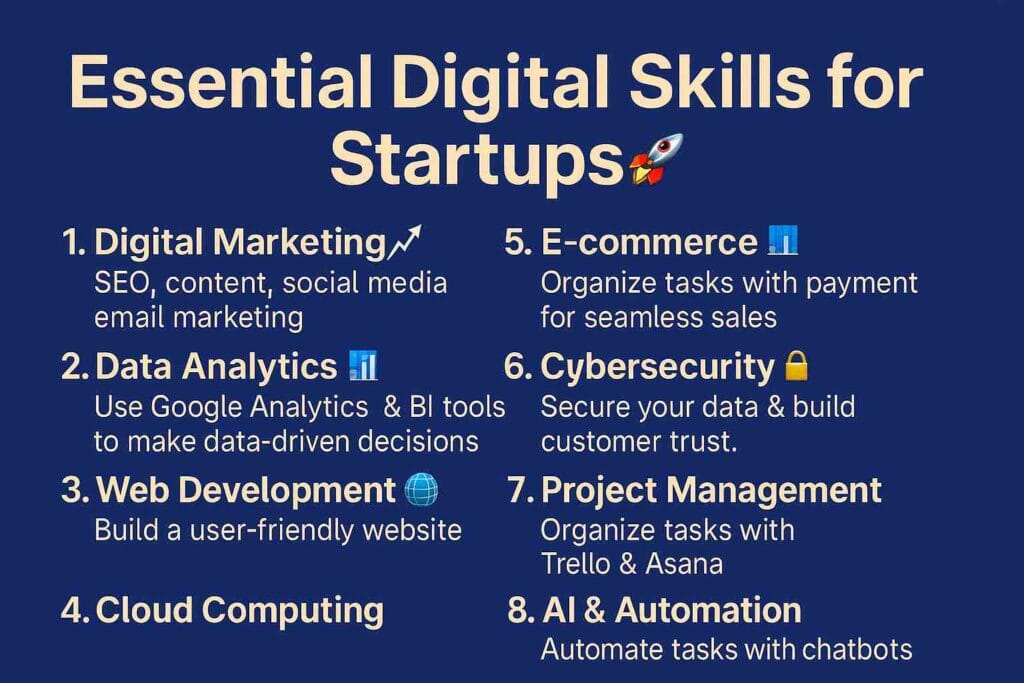Essential Digital Skills for Startups: Key Competencies for Success

In the ever-evolving world of technology, startups need to be equipped with the right digital skills to succeed. Digital transformation has reshaped industries across the globe, and businesses are increasingly relying on technological tools and platforms to gain a competitive edge. For startups, the right skillset can determine whether they thrive or fail in the marketplace.
In this article, we’ll explore the essential digital skills that startups need to thrive in today’s competitive business environment.
1. Digital Marketing
Digital marketing has become one of the most crucial skills for any startup. Whether you’re offering a product or a service, knowing how to effectively market your business online is essential.
Key areas to focus on:
- Search Engine Optimization (SEO): This helps increase visibility and rank on search engines, driving organic traffic to your website.
- Content Marketing: Creating valuable content that engages your audience and builds brand awareness.
- Social Media Marketing: Platforms like Facebook, Instagram, LinkedIn, and Twitter offer valuable opportunities for outreach.
- Email Marketing: A direct and personal way to engage with your customers, announce new offerings, and build relationships.
2. Data Analytics
The ability to collect, interpret, and leverage data is crucial for decision-making in today’s digital-first world. Startups must understand how to measure their efforts and assess their impact, whether it’s user engagement, sales conversions, or customer behavior.
Key tools to consider:
- Google Analytics: For website and user behavior tracking.
- Business Intelligence (BI) tools: Software like Tableau, Power BI, and others that help visualize complex data and provide insights.
- A/B Testing: Testing different versions of a web page or app to identify what works best.
3. Web Development and Design
Building an intuitive, user-friendly, and visually appealing website is essential for any startup. Understanding the basics of web development, or having a team member who possesses these skills, can save time and money in the long run.
Key areas to focus on:
- HTML/CSS/JavaScript: These are the building blocks of the web.
- User Experience (UX) Design: Ensuring your website or app provides a seamless experience for users.
- Responsive Design: Making sure your website works well across all devices, from desktop to mobile.
- Content Management Systems (CMS): Platforms like WordPress or Wix allow you to easily update and manage your content.
4. Cloud Computing and IT Infrastructure
Startups often work with limited resources, so leveraging cloud-based tools can offer cost-effective solutions. Cloud computing allows startups to scale their operations without the need for heavy physical infrastructure.
Important tools to explore:
- Amazon Web Services (AWS), Google Cloud, and Microsoft Azure: These platforms provide hosting, computing power, and other tools needed to run your digital business.
- Collaboration Tools: Tools like Google Drive, Slack, and Trello are essential for smooth remote work and communication within teams.
5. E-commerce Management
If your startup operates in e-commerce, having skills related to online selling platforms is essential. You need to know how to list products, manage payments, and ensure a smooth customer experience.
Key areas to focus on:
- E-commerce Platforms: Shopify, WooCommerce, or Magento can help you set up an online store.
- Payment Gateways: Understanding how to integrate payment options like PayPal, Stripe, and others is crucial for smooth transactions.
- Inventory Management: Tools like TradeGecko or QuickBooks Commerce help manage stock and orders efficiently.
6. Cybersecurity
Startups handle a lot of sensitive data, from customer information to financial transactions. Ensuring that your digital assets are secure is paramount to building trust with your customers.
Key areas to focus on:
- Data Protection: Complying with regulations like GDPR (General Data Protection Regulation) and securing customer data.
- Network Security: Implementing firewalls, encryption, and secure networks to protect business operations.
- Password Management and Multi-Factor Authentication: To reduce the risk of hacking or unauthorized access.
7. Project Management Tools and Techniques
As startups often operate in fast-paced environments, managing projects and tasks efficiently is crucial. Using project management tools can streamline collaboration and keep everyone on the same page.
Popular tools:
- Trello or Asana: For task management and organizing workflows.
- Basecamp: A project management platform that helps teams collaborate and track project progress.
- Jira: Widely used in software development for bug tracking, project management, and agile workflows.
8. Customer Relationship Management (CRM)
Customer acquisition and retention are the core components of any business. Implementing a CRM system can help you manage customer interactions, track leads, and build stronger relationships.
Key CRM tools:
- Salesforce: One of the most popular CRM platforms with a range of features.
- HubSpot CRM: Offers a free version with many useful features for startups.
- Zoho CRM: A flexible, cost-effective option for startups.
9. Artificial Intelligence (AI) and Automation
AI and automation are transforming how businesses operate. Whether it’s automating customer service with chatbots or using AI for personalized marketing campaigns, these tools can significantly reduce the time spent on repetitive tasks.
Key areas to focus on:
- Chatbots and Virtual Assistants: Tools like Intercom, Drift, or Chatfuel can automate customer service and engagement.
- Marketing Automation: Platforms like Mailchimp or Marketo can automate email campaigns based on user behavior.
- AI-powered Analytics: Tools that leverage AI to predict customer behavior and improve decision-making.
Conclusion
In today’s digital landscape, startups need to embrace a range of digital skills to ensure success. These competencies not only enhance business operations but also foster growth, customer engagement, and innovation. As technology continues to advance, staying ahead of the curve and continuously improving your digital skillset is essential for remaining competitive and sustaining long-term success.
By focusing on digital marketing, data analytics, web development, cloud computing, cybersecurity, and the use of automation tools, startups can position themselves for growth and adapt to the ever-changing digital world.
Source : Medium.com





Nice post! 1754809871
Great information!